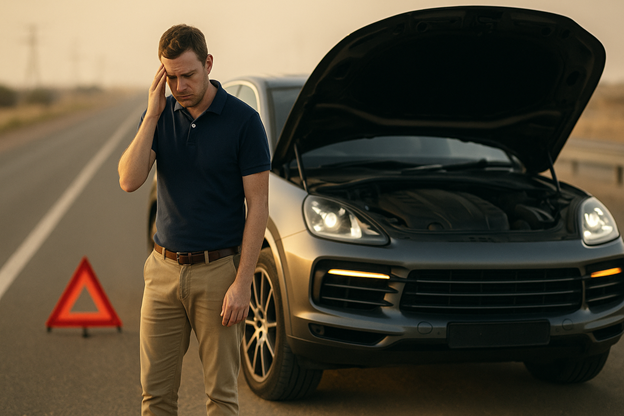5 Common Issues in Porsche Cayenne in the UAE
The Porsche Cayenne stands as a testament to German engineering prowess, successfully bridging the gap between luxury SUV practicality and sports car performance. In the UAE market, where the Cayenne has become synonymous with prestige and capability, owners appreciate its ability to handle everything from daily commutes through Dubai’s bustling streets to weekend desert excursions. However, the challenging environmental conditions of the United Arab Emirates present unique maintenance challenges that can affect even the most meticulously engineered vehicles. Understanding these common issues can help Cayenne owners make informed decisions about maintenance schedules and identify when professional Porsche repair Dubai services are necessary.

1. Cooling System Complications
The UAE’s relentless heat places extraordinary demands on the Porsche Cayenne’s cooling system, making it one of the most stressed components in local operating conditions. With ambient temperatures regularly exceeding 50°C during summer months and the additional heat generated by stop-and-go traffic in major cities, the cooling system works continuously at maximum capacity, leading to accelerated component wear and potential failures.
The most common cooling system issues in UAE-operated Cayennes include radiator deterioration due to thermal cycling and sand particle infiltration, water pump failures occurring earlier than manufacturer specifications suggest, and thermostat malfunctions that can lead to overheating or overcooling scenarios. The coolant expansion tank, constructed from plastic materials, becomes particularly vulnerable to cracking under the constant thermal stress experienced in desert climates.
Coolant hose degradation represents another significant concern, as the rubber compounds used in standard hoses may not withstand the prolonged exposure to extreme temperatures. The auxiliary cooling fans, which operate more frequently and for longer durations in UAE conditions, often experience motor failures or electronic control issues that can compromise the entire cooling system’s effectiveness.
Early warning signs include temperature gauge readings that fluctuate more than normal, visible coolant leaks in parking areas, steam or unusual odors from the engine bay, and dashboard warning lights indicating cooling system faults. When these symptoms appear, seeking immediate Porsche repair Dubai assistance is crucial, as cooling system failures can lead to catastrophic engine damage if not addressed promptly.
Preventive maintenance becomes even more critical in the UAE environment. Regular coolant changes using high-temperature formulations, periodic radiator cleaning to remove sand and debris accumulation, and proactive replacement of cooling system components at shorter intervals can significantly reduce the risk of unexpected failures. Repair costs for cooling system components typically range from AED 800 for minor hose replacements to AED 6,000 or more for complete radiator or water pump replacements using genuine Porsche parts Dubai suppliers.
2. Air Suspension System Deterioration
The Porsche Cayenne’s sophisticated air suspension system, designed to provide optimal comfort and handling across various terrain types, faces particular challenges in the UAE’s environment. The combination of extreme temperature variations, from air-conditioned interiors to scorching outdoor conditions, along with fine sand particles that can infiltrate even well-sealed systems, accelerates wear on critical air suspension components.
Air springs, the heart of the suspension system, experience thermal expansion and contraction cycles that far exceed those encountered in temperate climates. The rubber and synthetic materials used in air spring construction gradually lose their elasticity and structural integrity under these conditions. Compressor units work harder and more frequently to maintain proper ride height, leading to premature motor failures and increased electrical system stress.
The electronic control modules that manage air suspension operation can also suffer from heat-related malfunctions, as underhood temperatures in parked vehicles regularly exceed 80°C during summer months. Height sensors may drift from their calibrated positions due to thermal expansion of mounting components, leading to incorrect ride height adjustments and system error codes.
Common symptoms of air suspension problems include sagging corners, particularly noticeable after the vehicle has been parked overnight in extreme heat, unusual noises during height adjustments, dashboard warning lights indicating suspension system faults, and uneven tire wear patterns that suggest improper vehicle geometry. The system may also exhibit sluggish response times when adjusting between different height settings, indicating potential compressor or valve block issues.
Professional diagnosis using specialized diagnostic equipment is essential for accurately identifying air suspension problems, as the system’s complexity requires expertise beyond general automotive repair capabilities. Replacement costs for air suspension components can be substantial, with individual air springs ranging from AED 2,000 to 4,000 each, while compressor assembly replacement may exceed AED 8,000. However, addressing issues promptly through qualified Porsche repair Dubai services can prevent more extensive system damage and ensure continued reliability.
3. Transmission and Drivetrain Stress
The Porsche Cayenne’s advanced transmission systems, whether the traditional Tiptronic automatic or the newer PDK dual-clutch configuration, face significant challenges in UAE operating conditions. The combination of extended highway driving at high speeds, frequent stop-and-go traffic scenarios, and extreme ambient temperatures places exceptional stress on transmission components and fluid systems.
Transmission fluid degradation occurs more rapidly in desert climates, as prolonged exposure to high temperatures breaks down the complex chemical compounds that provide lubrication and hydraulic operation. The torque converter, clutch packs, and valve body components experience accelerated wear when operating with degraded fluid, potentially leading to harsh shifting, slipping sensations, or complete transmission failure.
The all-wheel-drive system, a hallmark of Cayenne capability, includes additional components such as transfer cases, differentials, and drive shafts that must operate reliably under extreme conditions. The viscous coupling or electronically controlled clutch systems used to distribute power between front and rear axles can overheat during aggressive driving or when operating in sand, leading to premature wear or failure.
PTM (Porsche Traction Management) system components, including sensors and electronic control units, may experience calibration drift or failure due to thermal stress and vibration from rough road surfaces. These systems are crucial for maintaining optimal traction and stability, particularly when transitioning between different driving surfaces common in the UAE environment.
Warning signs of transmission and drivetrain problems include delayed or harsh shifting patterns, unusual noises during acceleration or deceleration, vibrations felt through the steering wheel or floorboard, and dashboard warnings indicating drivetrain system faults. Some owners may notice reduced fuel efficiency or a burning odor after spirited driving sessions, indicating potential fluid overheating.
Regular transmission service intervals become even more critical in UAE conditions, with many experts recommending fluid and filter changes at 40,000-kilometer intervals rather than the standard 60,000-kilometer specification. Major transmission repairs can be costly, with rebuild or replacement procedures ranging from AED 15,000 to 25,000, making preventive maintenance through qualified facilities using genuine Porsche parts Dubai sources a wise investment.
4. Electronic System Heat-Related Failures
Modern Porsche Cayennes incorporate extensive electronic systems that control engine management, infotainment, safety features, and comfort functions. The UAE’s extreme temperature environment creates challenging conditions for these sophisticated electronic components, leading to failures that are less common in moderate climates.
The Porsche Communication Management (PCM) system, serving as the central hub for infotainment and vehicle settings, frequently experiences heat-related malfunctions during peak summer months. Dashboard temperatures can exceed 70°C in parked vehicles, causing LCD screens to malfunction, touch sensitivity to diminish, or complete system shutdowns to occur. The navigation system’s GPS receiver and cellular communication modules may also experience reduced performance or failure under extreme thermal stress.
Engine management systems, including numerous sensors that monitor everything from air intake temperature to exhaust gas composition, can drift from their calibrated specifications when subjected to prolonged high-temperature exposure. These sensor inaccuracies can lead to suboptimal engine performance, increased fuel consumption, or trigger dashboard warning lights that indicate system malfunctions.
Advanced safety systems such as adaptive cruise control, lane departure warning, and parking assistance rely on cameras, radar sensors, and ultrasonic devices that may experience reduced accuracy or complete failure when operating temperatures exceed design specifications. The automatic climate control system’s electronic components work continuously under maximum load conditions, leading to premature failure of actuator motors, temperature sensors, and control modules.
Comfort and convenience features, including power seat adjustments, window regulators, and keyless entry systems, incorporate electronic components that may malfunction due to thermal stress and the corrosive effects of high humidity in coastal areas. These failures often manifest as intermittent operation, complete loss of function, or erratic behavior that can be frustrating for owners.
Professional diagnostic procedures using factory-level scanning equipment are essential for accurately identifying electronic system problems, as symptoms may be intermittent or may not trigger obvious error codes. Repair costs vary significantly depending on the affected system, ranging from software updates costing a few hundred dirhams to major control module replacements that can exceed AED 8,000. Working with experienced Porsche repair Dubai technicians ensures proper diagnosis and repair using appropriate genuine components.
5. Brake System Performance Challenges
The final common issue facing UAE Porsche Cayenne owners involves brake system performance degradation, which occurs more rapidly due to the demanding driving conditions prevalent throughout the region. The combination of high-speed highway driving, frequent heavy braking in urban traffic, and extreme ambient temperatures creates an operating environment that stresses brake components beyond typical design parameters.
Brake pad and rotor wear occurs at accelerated rates, with many UAE owners reporting replacement requirements at intervals 25-40% shorter than manufacturer specifications suggest for temperate climates. The high-performance brake compounds used in Porsche applications generate significant heat during operation, and when combined with extreme ambient temperatures, can lead to brake fade, reduced stopping power, or even component failure.
Brake fluid, crucial for maintaining proper hydraulic pressure throughout the system, requires more frequent replacement in UAE conditions due to moisture absorption from humid coastal air and thermal breakdown from extreme operating temperatures. Degraded brake fluid can cause spongy pedal feel, reduced braking effectiveness, or complete brake system failure in severe cases.
The electronic brake systems, including Porsche Stability Management (PSM), hill-hold assist, and auto-hold functions, rely on sensors and control modules that may experience drift or failure due to extreme temperature exposure and vibration from aggressive driving or rough road surfaces. These systems are integral to vehicle safety and proper operation, making prompt attention to any brake-related warnings essential.
Additionally, the brake cooling ducts and ventilated rotor designs, while effective in normal conditions, may become less efficient when ambient temperatures exceed 45°C, leading to increased brake temperatures and accelerated component wear. Some owners opt for upgraded brake cooling solutions or high-temperature brake fluid formulations to address these challenges.
Regular brake system inspection and maintenance become even more critical in UAE operating conditions, with experts recommending brake fluid replacement annually rather than the standard two-year interval. Quality brake components from reputable Porsche parts Dubai suppliers ensure optimal performance and safety in local driving conditions, though costs can be substantial, with complete brake system rehabilitation potentially exceeding AED 12,000 for larger Cayenne models equipped with ceramic brake options.
Understanding these common issues empowers UAE Porsche Cayenne owners to make informed maintenance decisions and recognize when professional intervention is necessary. The key to minimizing repair costs and ensuring reliable operation lies in proactive maintenance, using quality components, and partnering with experienced specialists who understand the unique challenges of operating luxury vehicles in the demanding Middle Eastern environment.






